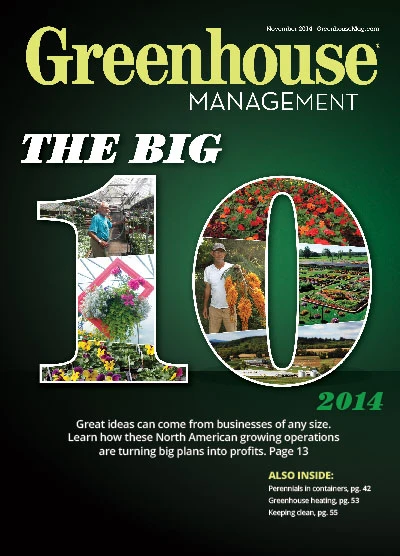 The Verheuls know something about exporting — they’ve done it themselves.
The Verheuls know something about exporting — they’ve done it themselves.
In 1983, when Scarface and Return of the Jedi ruled the box office, when the King of Pop was denying everything, singing “the kid is not my son” in his hit song “Billie Jean,” Michiel Verheul and his wife Ina decided to emigrate from the Netherlands to Canada.
The young couple (wed in January of 1983) moved to their new nation on February 9, 1983. Michiel accepted a position as a grower in Alberta, Canada, but it was temporary; he wanted his own business. In 1987, the couple took the proverbial plunge and launched High Q Greenhouses. They began selling propagation materials to small and mid-sized growers. By 1988 the company was outgrowing its humble rented greenhouse. In 1992, the company was sitting on 20,000 square feet of indoor growing space and were scheduling orders from around the country by hand.
“We now have customers from the British Columbia border to the Ontario Border,” Michiel Verheul says. “It was quite a challenge managing back orders, finding new shipping companies and growing our customer base and product line.”
In 2014, moving toward 2015, Verheul says his company now grows young plants from unrooted cuttings (URCs) rather than seed. To continue to compete and remain profitable, High Q Greenhouses has added wholesale customers (independent retailers only), added retail and other unique items. They now offer 512 plugs and rooted cuttings in a wide variety of tray sizes.
So what has allowed High Q to thrive through difficult economic times?
Niches. Michiel Verheul believes his company serves a niche.
“We need to supply young plants to a demographic that fits our region. We need to offer not only a huge selection to make us a ‘one stop shop,’ but we offer all young plants in smaller quantities. We offer trays of 50 plugs. We have a Blackmore tray that breaks in two. We offer ornamental grasses in trays of 36. We sell direct,” he says.
The company tries to cater to small and mid-size growers throughout Canada and, to some extent, the United States.
“We ship into the northern territories. Our most northern customer is in the Polar Circle. We ship south to the United States border, west into British Columbia and east to Northern Ontario; and, of course, all shipping points in between,” he says.
To ship, High Q utilizes a select number of trucking companies. Their major trucking line is West Coast Floral from the greater Vancouver area. West Coast Floral specializes in perishable transportation and will pick up in Edmonton and drop the product in heated warehouses from Edmonton to Winnipeg.
 High Q employs a multiple picking day system so that product can stay on the bench as long as possible. The picking carts have trays so the plants only draw water from below, keeping the foliage as dry as possible. Boxes stay open as long as they can and are palletized so warmth from the reefer can flow around the boxes. A chain of heated warehouses (as previously mentioned) dot the transportation path and High Q uses a waxed insert and newspaper to absorb any free water during the shipping process when temperatures fluctuate.
High Q employs a multiple picking day system so that product can stay on the bench as long as possible. The picking carts have trays so the plants only draw water from below, keeping the foliage as dry as possible. Boxes stay open as long as they can and are palletized so warmth from the reefer can flow around the boxes. A chain of heated warehouses (as previously mentioned) dot the transportation path and High Q uses a waxed insert and newspaper to absorb any free water during the shipping process when temperatures fluctuate.
Verheul believes that one of the benefits of his company is that they can cater to smaller growers that might have trouble meeting minimum shipping requirements from other propagation companies. While he doesn’t have a large number of American customers, it’s a facet of his business that he’d like to explore expanding.
“Horticultural products are covered under the NAFTA, so shipping is easy. We believe that there are a huge amount of customers that we don’t currently reach that could benefit from what we offer. Via FedEx we can ship rooted young plants through a two-day service. We can also use several live plant trucking companies that travel between the United States and Canada,” he says.
The company takes as many steps as it can to cater directly to customers. It’s a strategy that has helped High Q increase its sales and grow its business. They maintain an active Facebook page, a useful website and they work with select broker clientele to sell to customers digitally. They try to offer growing tips and pictures to customers who need help. They ship tags with all patented plants but they include tags for generic products, as well. A rigid schedule allows them to ship early in the week and then host pick-ups on Thursdays and Fridays.

Explore the November 2014 Issue
Check out more from this issue and find your next story to read.
Latest from Greenhouse Management
- 2025 Proven Winners Horticulture Scholarship applications now open
- How to improve inventory and shipping management in the greenhouse
- Leading Women of Horticulture: Anna Ball, Ball Hort, and Terri McEnaney, Bailey Nurseries
- GM CEA HERB Part 2: A guide to increasing the sowing density of culinary herbs
- GM CEA HERB Part 1: Best practices for producing culinary herbs in controlled environments
- USDA fires experts on invasive pests, including Asian citrus psyllid, chilli thrips
- CEA Alliance celebrates bipartisan introduction of Supporting Innovation in Agriculture Act
- Dümmen Orange North America celebrating 25th anniversary in 2025






